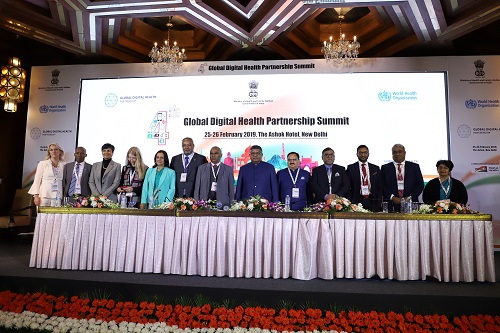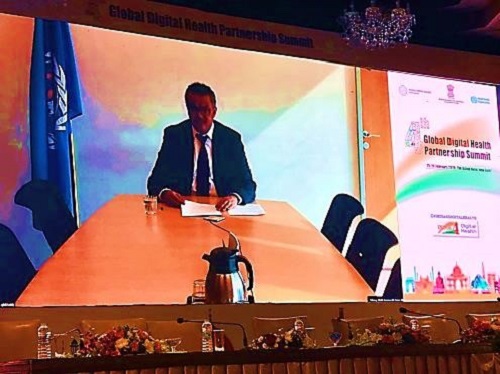25-26 February 2019, New Delhi

Day 1: 25 February 2019
The 4th Global Digital Health Partnership (GDHP) summit was organized by the Ministry of Health and Family Welfare (MoHFW), Government of India in partnership with the World Health Organization (WHO) and Global Digital Health Partnership from 25 to 26 February 2019 in New Delhi, India. Mr J P Nadda, Union Minister of Health and Family Welfare inaugurated the event in the presence of Mr Ravi Shankar Prasad, Union Minister of Law and Justice and Electronics and Information Technology and Health ministers from several countries.
Speaking on the occasion, Mr Nadda said, “Our vision is to create an integrated digital health platform and have longitudinal electronic health record for 1.3 billion people of India.”

“Ayushman Bharat is primarily dependent on maximising the use of digital tools for effective implementation and monitoring,” added the Health Minister, referring to the National Health Insurance scheme, covering 500 million people with an insurance coverage of INR 500 000 per year per family. “India also plans to have 150 000 Health and Wellness Centres at the primary and sub-centre level, which provide not only curative services but also preventive and promotive services to citizens at the cutting-edge level. Through robust digital interventions, we have ensured a continuum of care across primary, secondary and tertiary facilities gets delivered,” Mr Nadda further said.

Dr Tedros Adhanom Ghebreyesus, WHO Director-General in his message shared that, “Digital technologies are not just the latest trend – they are a vital tool for strengthening primary care, achieving universal health coverage, and achieving Sustainable Development Goals.” Speaking on bridging the gap of access to health services, Dr Tedros said, “Telemedicine, remote care and mobile health are helping us transform health by delivering care in people’s homes, instead of in hospitals and clinics.”
Dr Poonam Khetrapal Singh, WHO Regional Director for South-East Asia said, “Technology has been the single greatest accelerator in advancing human health. Achieving universal health coverage as our Region has sought to do since 2014, is dependent on taking full advantage of the opportunities eHealth holds. Member States in this Region are now implementing their own digital health strategies and plans, designed to improve patient care and to improve health service management.”
Ms Preeti Sudan, Secretary, Ministry of Health and Family Welfare highlighted that, “India is committed to ensuring health for all through a sound policy enabled environment for digital health.”
The GDHP is an international collaboration of governments, government agencies and multinational organizations. It demonstrates the commitment of the Member States towards improving quality, accessibility and sustainability of health systems.
Ministers and government officials from over 35 countries attended the event to discuss the impact of digital technologies on health systems and health services delivery. Dignitaries at the event included Mr Upendra Yadav, Deputy Prime Minister and Minister for Health, Nepal, Dr Tawfiq Al Rabiah, Minister of Health, Kingdom of Saudi Arabia (Video Address) Mr Zahid Maleque, Minister of Health and Family Welfare, Bangladesh, Ms Lena Hallengren, Minister of Health, Sweden, Dr Arlindo Nascimento do Rosário, Minister of Health, Cape Verde, Dr Ulana Suprun, Minister of Health, Ukraine Mr Faizal Cassim, Deputy Minister of Health, Nutrition and Indigenous Medicine, Sri Lanka Mr Biggie Ganda Butale, Assistant Minister of Health and Wellness, Botswana, Dr Shah Mahir, State Minister of Health, Maldives. Dr Poonam Khetrapal Singh, Regional Director, WHO South-East Asia Region (SEAR), Dr Preeti Sudan, Secretary, Ministry of Health and Family Welfare, Ms Harinder Sidhu, Australia's High Commissioner to India, Shri Sanjeeva Kumar, Additional Secretary, Ministry of Health and Family Welfare and Mr Tim Kelsey, Chief Executive, Australian Digital Health Agency, Australia were also present at the inaugural session.
India took the world stage at the Seventy-first World Health Assembly in Geneva, Switzerland by successfully introducing and unanimous adoption of Resolution on Digital Health. This resolution highlighted global attention to the potential, challenges and opportunities of Digital Health interventions and the need for closer collaboration on the issue globally for countries achieving health-related SDG targets as well WHO's implementation of 13th General Programme of Work.
The key focus of the summit was on digital health interventions, with sessions on digital health ecosystem for universal health coverage (UHC); integrated platforms for e-learning; integrated disease surveillance and disease registry platforms; tele-medicine and remote monitoring; and integrated clinical decision support tools for primary care. The discussions from the ministerial conclave on digital health vis-à-vis digital health ecosystem for UHC and five work streams of the global digital health partnership i.e. cyber security, evidence and evaluation, policy environments, interoperability and clinical and consumer engagement will also be covered.
The GDHP is of great importance, especially for its significant role in bringing together international experts representing multi-disciplinary sectors on one platform for a productive exchange of knowledge and information on safe and secure digital technologies. The two-day summit culminated with the Organisation of the International Digital Health Symposium on 27 February.
